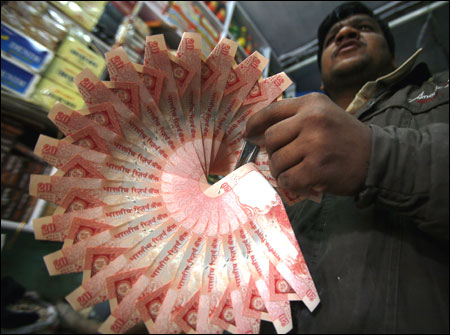Photographs: Jayanta Dey/Reuters Nivedita Mookerji in New Delhi
It's an open season of retrospective laws -- as many as 17 of these have been proposed in Budget 2012-13 under direct taxes, as against just one in the previous year.
While some -- the one involving Vodafone-like cases is on top of the charts -- give limitless powers to tax authorities, there are quite a few that may actually benefit the taxpayer.
. . .
When taxpayers are above the taxman
Though analysts doubt whether any of the amendments have been proposed with the intention of helping the taxpayer and dismissed these efforts as an attempt by the government to plug loopholes in the existing legal framework through clarificatory amendments, many experts say they will indeed help the taxpayer -- irrespective of the original intention of the government.
Take, for example, the retrospective amendment in the case of Deduction in Respect of Capital Expenditure on Specified Business.
With this, a hotel owner will continue to be eligible for investment-linked deduction, if he, while continuing to own the hotel, transfers the operation of the hotel to another person.
. . .
When taxpayers are above the taxman
This will come into effect from April 2011.
Till now, investment-linked deduction was allowed to the owner of a hotel if he himself was operating it.
The outsourcing arrangement for running hotels is catching on as a trend in India. Another such amendment that will come into effect with a back date relates to the rationalisation of tax deduction at source and tax collection at source provisions.
This provides for extension of time for passing an order in certain cases.
"Under the current provisions, a person can be deemed an assessee in default, by an order, in respect of non-deduction or short deduction of tax," according to the Act.
. . .
When taxpayers are above the taxman
While such an order can now be passed within four years from the end of a financial year in a case where no statement has been filed, the Budget has proposed to amend section 201 of the I-T Act to extend the time limit from four to six years.
This is with effect from April 2010.
The Budget has proposed presumptive taxation, where eight per cent of the turnover or gross receipts is considered profit from business, will not apply to any person carrying out a profession as referred to in sub section 1 of section 44AA in the I-T Act.
. . .
When taxpayers are above the taxman
Also, people earning commission or brokerage income will be exempt from presumptive taxation.
This amendment will be effective from April 2011.
The Budget kept in mind the wealth of the Reserve Bank of India, too, while drafting the retrospective amendments.
An amendment, with effect from April 1957, proposes to exempt RBI from paying wealth tax.
"In order to provide that the RBI is not liable to pay wealth tax, it is proposed to amend section 45 of the Act to provide that wealth tax shall not be levied on the net wealth of RBI," it said.







article